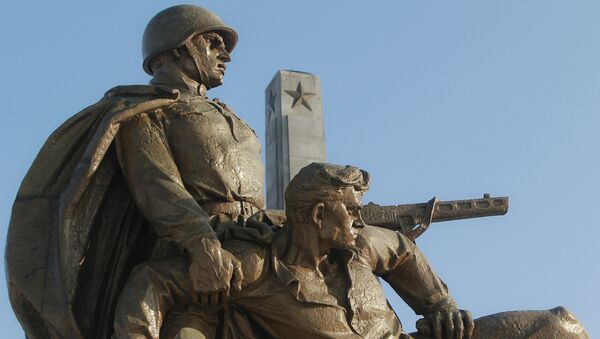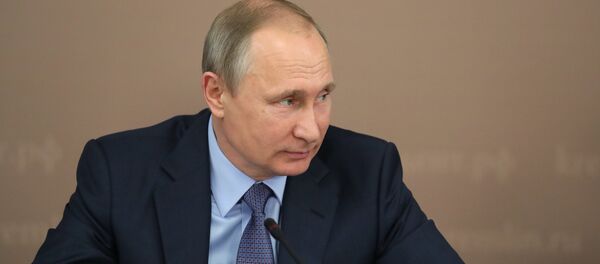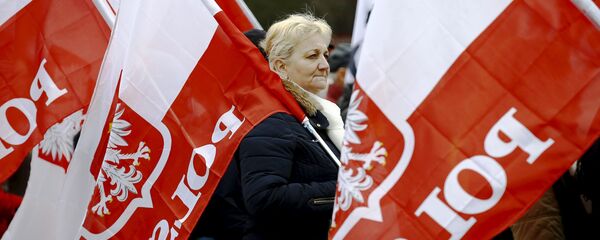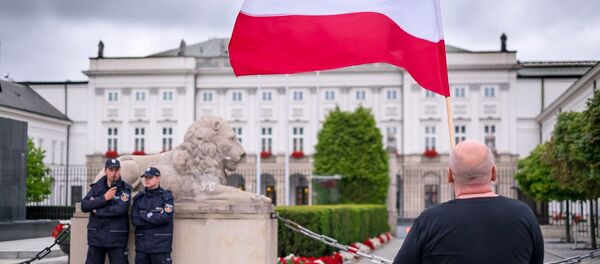Russophobia has become Poland's state doctrine promoted by the incumbent government, Leszek Miller, the former Polish prime minister in the government of President Aleksander Kwasniewski, told Sputnik, adding that Warsaw's stance is obviously influencing Polish people, most notably, the youngsters.
"At some point [Polish] politicians in power began to rewrite the history of Poland," Miller told Sputnik Polska's Leonid Sviridov. "They argue that World War II ended for Poland in 1989. They also compare the German occupation with the 'Soviet occupation', as they call it, which lasted to 1989."
Commenting on the desecration of graves of Soviet soldiers who liberated Warsaw from the Nazis in 1945 by Polish vandals and the demolition of the Red Army monument in the Polish town of Trzcianka, Miller denounced the moves as "barbarous."
"The destruction of cemeteries has a barbarous aspect and, from my point of view, it does not matter whether Russian, Polish, or Jewish soldiers were laid to rest in these graves," he said, adding that those fighting with the deceased are committing reprehensible actions.
"I am against the destruction of cemeteries or places of memory dedicated to those soldiers who crossed Poland in order to defeat Hitler's Germany in Berlin," the ex-prime minister stressed. "I can only regret that in my country there are Poles who are engaged in vandalism."
According to Miller, the demolition of WWII memorials will further aggravate tensions between Moscow and Warsaw and have repercussions for Poland on the global arena.
"I believe that Russia should be perceived as a partner and I very much regret that the Polish Foreign Ministry has not thawed frozen border contacts, I mean the Warmia-Mazury province and the border with Kaliningrad. This harmed the interests of the Polish population, which lives in the border areas," the politician said, referring to Warsaw's decision not to resume local cross-border traffic halted in July 2016.
Previously, in 2012 Russia and Poland struck an agreement on simplified local border crossing in the Kaliningrad region, as well as parts of Poland's Warmia, Mazury and Pomerania regions.
The politician opined that under the incumbent Polish government there is a little if any hope for the normalizations of Russo-Polish relations.
In mid-July Polish President Andrzej Duda signed a bill on the prohibition of communist propaganda that regulates the demolition of Soviet-era monuments. The "de-communization" law prohibits the use of names that honor persons, organizations, events and dates symbolizing communism for public spaces.
According to Poland's Institute of National Remembrance, the law will apply to 230 monuments commemorating the soldiers of the Soviet Red Army, among many others.
The move came as no surprise as it was preceded by the demolition and defacement of 30 Soviet monuments in 2015 in Poland.
In response to Warsaw's move, Russia's State Duma adopted an appeal to European lawmakers on July 19, urging them to resist the destruction of monuments and memorials commemorating the soldiers who liberated Europe from Nazism. The Parliament of Israel adopted a similar appeal.
Speaking to RIA Novosti in early August, Polish Foreign Minister Witold Waszczykowski claimed that Warsaw "will take care of the cemeteries but [it is] not going to take care of the monuments which were created and built by Communist Poland after the Second World War to commemorate the Red Army."
On September 2 a rally against the dismantlement of monuments commemorating Soviet soldiers took place in Warsaw, next to the US Embassy. Protesters demanded a review of the legislation banning communist propaganda stressing that the WWII-era memorials should not be destroyed under the law. The participants included members of Kursk, a nongovernmental organization that restores Soviet war memorials in Poland, and members of the unregistered Zmiana (Change) party.







